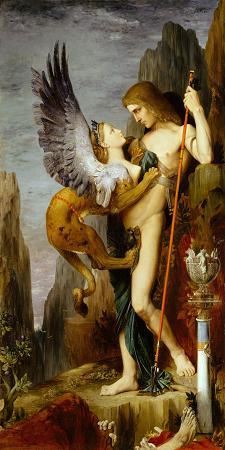Oedipus. Oedipus was a mythical Greek king of Thebes. A tragic hero in Greek mythology, Oedipus accidentally fulfilled a prophecy that he would end up killing his father and marrying his mother, thereby bringing disaster to his city and family. The story of Oedipus is the subject of Sophocles' tragedy Oedipus Rex, which is followed in the narrative sequence by Oedipus at Colonus and then Antigone. Together, these plays make up Sophocles' three Theban plays. Oedipus represents two enduring themes of Greek myth and drama: the flawed nature of humanity and an individual's role in the course of destiny in a harsh universe. In the best known version of the myth, Oedipus was born to King Laius and Queen Jocasta. Laius wished to thwart the prophecy, so he sent a shepherd-servant to leave Oedipus to die on a mountainside. However, the shepherd took pity on the baby and passed him to another shepherd who gave Oedipus to King Polybus and Queen Merope to raise as their own. Oedipus learned from the oracle at Delphi of the prophecy that he would end up killing his father and marrying his mother but, unaware of his true parentage, believed he was fated to murder Polybus and marry Merope, so left for Thebes. On his way he met an older man and killed him in a quarrel. Continuing on to Thebes, he found that the king of the city had been recently killed, and that the city was at the mercy of the Sphinx. Oedipus answered the monster's riddle correctly, defeating it and winning the throne of the dead king-and the hand in marriage of the king's widow, who was also his mother Jocasta. Years later, to end a plague on Thebes, Oedipus searched to find who had killed Laius, and discovered that he himself was responsible. Jocasta, upon realizing that she had married her own son, hanged herself. Oedipus then seized two pins from her dress and blinded himself with them. The legend of Oedipus has been retold in many versions, and was used by Sigmund Freud to name and give mythic precedent to the Oedipus complex. Variations on the legend of Oedipus are mentioned in fragments by several ancient Greek poets including Homer, Hesiod, Pindar, Aeschylus and Euripides. However, the most popular version of the legend comes from the set of Theban plays by Sophocles: Oedipus Rex, Oedipus at Colonus, and Antigone. Oedipus was the son of Laius and Jocasta, king and queen of Thebes. Having been childless for some time, Laius consulted the Oracle of Apollo at Delphi. The Oracle prophesied that any son born to Laius would kill him. In an attempt to prevent this prophecy's fulfillment, when Jocasta indeed bore a son, Laius had his ankles pierced and tethered together so that he could not crawl; Jocasta then gave the boy to a servant to abandon on the nearby mountain. However, rather than leave the child to die of exposure, as Laius intended, the servant passed the baby on to a shepherd from Corinth and who then gave the child to another shepherd. The infant Oedipus eventually came to the house of Polybus, king of Corinth and his queen, Merope, who adopted him, as they were without children of their own. Little Oedipus was named after the swelling from the injuries to his feet and ankles. After many years, Oedipus was told by a drunk that he was a bastard, meaning at that time that he was not their biological son. Oedipus confronted his parents with the news, but they denied this. Oedipus went to the same oracle in Delphi that his birth parents had consulted. The oracle informed him that he was destined to murder his father and marry his mother. In an attempt to avoid such a fate, he decided not to return home to Corinth, but to travel to Thebes, which was closer to Delphi. On the way, Oedipus came to Davlia, where three roads crossed each other. There he encountered a chariot driven by his birth-father, King Laius. They fought over who had the right to go first and Oedipus killed Laius when the charioteer tried to run him over. The only witness of the king's death was a slave who fled from a caravan of slaves also traveling on the road at the time. Continuing his journey to Thebes, Oedipus encountered a Sphinx, who would stop all travelers to Thebes and ask them a riddle. If the travelers were unable to answer her correctly, they would be killed and eaten; if they were successful, they would be free to continue on their journey. The riddle was: What walks on four feet in the morning, two in the afternoon and three at night?. Oedipus answered: Man: as an infant, he crawls on all fours; as an adult, he walks on two legs and; in old age, he uses a walking stick.
more...




